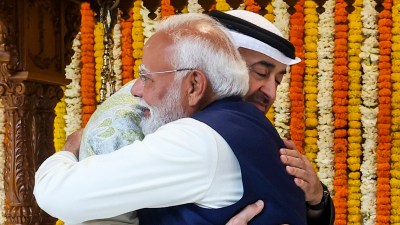Looking back in yearning
While almost everyone I know is looking forward to the coming millennium, I find myself looking back in yearning to an India that is now s...

While almost everyone I know is looking forward to the coming millennium, I find myself looking back in yearning to an India that is now slipping into the past. It is a question of values. The India that my contemporaries are yearning for is an India rich in money and strong in arms. The India I see vanishing is an India which was rich in spirit and strong in conviction.
As India turned from 1899 to the 20th century, our elite stood transfixed by the might of our rulers. The most radical demand made by the 14-year-old Indian National Congress born this day, 1885 was for an element of participation in the governance of our country. No more. The economy was completely liberalised and totally globalised.
We were an integral part of the world8217;s largest trading bloc the British Empire and open entirely to foreign investment. There were no restrictive regulations, few tariff or non-tariff barriers, and free of exchange control on both current and capital account. In a significant sense, therefore, the 50years of pacification that followed 1857 were years of unprecedented economic progress. The railways spread their network. The ports of Calcutta, Bombay and Madras developed as major centres of world commerce. Calcutta, seat of the Empire, was, without rival, the greatest city of Asia. Jute and tea were converted into massive sources of sterling earnings by the British trading houses and managing agencies of the time. The cotton mills of Bombay and Coimbatore ran-ked among the best in the world.
And yet the land lay prostrate. Famine killed more people in the 50 years following 1857 than ever previously. This was largely the consequence of modern industrialisation and unfettered international commerce depriving the rural populace of non-farm cottage industry income. GDP growth rates, for the economy as a whole, hovered around 1 to 2 per cent although the enclaves in and around the metropolises did spectacularly better. The zamindars and the rajahs flourished; the peasantry languished. The Rai Bahadurs andKhan Bahadurs were well-rewarded. The ordinary Indian remained mute, helpless, resigned.
The 20th century was what ended this perversion. The people of the land found their voice. It was a voice unlike any heard before. A demand for justice, articulated with steely determination, but in the gentlest of tones known to any revolution. While in the 8220;developed8221; world, the illusion of Victorian progress was overwhelmed by the grim blood-letting of the two world wars and hundreds of other wars, India stood up as an exemplar of non-violence as Truth. And of progress as the worship of Daridranarayana. When Gandhiji was assassinated at the mid-point of the 20th century, it was of him not of Roosevelt or Churchill, nor of Ford or the Rockefellers that Einstein said generations to come would scarce believe such a man walked this earth. We are now repudiating almost everything the Mahatma stood for. The repudiation has not been sudden. There has been a slow erosion of faith. There is now an erosion of memory.
Ilook back in yearning to an India that did not believe in nuclear weapons and ballistic missiles. I look back to an India that did not measure its self-respect in degrees of greed. I look back to an India that wanted to be itself, not a second-class clone. I look back to an India that proclaimed with quiet courage, 8220;Ekla chalo re8221;. The India we now look to is, I fear, an India of illusions. We think the nostrums of the 19th century liberalisation and globalisation will raise us in the 21st to the ranks of a great economic po-wer. And that our Bomb will make the legions tremble at our feet. I, depressingly, believe that if we repudiate the India of the 20th century, as we appear to be doing, the 21st century is going to be our Century of Disillusionment. Worse, it could be the Century of Enslavement, a return to the benevolent hegemony which the Indian elite of a hundred years ago admired so hugely.
Indian growth rates under Indian socialism soared over a half-century of Independence from 1 per cent to 6per cent. Our middle class has grown by a factor of ten, our population by under a factor of three. The yuppies who ride their foreign cars and flaunt their foreign clothes are, for the most part, children or grandchildren of fathers and grandfathers who thought bicycles were a luxury. The real income of the poor is the subsidies we now dismiss as 8220;non-merit goods8221;. Those who babble about there being more Indians below the poverty line today than there were Indians at independence need also to see that two-thirds of our people were then below the line; two-thirds today are above it.
As we seek to emulate others, the policies that wrought this transformation are being jettisoned. Few in India consider the terrible price in individual freedom, human rights and regional injustice that is being paid in China for the 8220;progress8221; it is making. Fewer still recognise that every developing country of comparable size and complexity to ours China and Indonesia are examples are self-sufficient in oil. We are not.Even fewer recognise that four-fifths of foreign investment in China is not foreign but ethnic investment by overseas Chinese. Mesme-rised by their example, 21st century India is readying itself to meekly tread the path that others have blazed.
The jettisoning of policies that have had their day is a matter of pragmatic adjustment. But if we do not maintain continuity with the essential values of our Gandhian socialist past, there will be no new dawn. We once had the courage of the truly non-violent; we now have the moral bankruptcy of a nation cowering behind a shield of nuclear weapons.
We once had the stature to reject a permanent seat on the UN Security Council, dismissing it as a club of evil. We now crave admittance. We once knew that our salvation lay in simplicity. We now want more and more for ourselves, less for the less fortunate. We were once proud of our non-dependence and self-reliance. We now seek a rear seat in the vanguard.
We once had the self-confidence to go our asymmetric way. Nowall we want is to 8220;belong8221;. For much of the 20th century, we were an India proud of ourselves. We are now an India ashamed. I look back in yearning to the India that was.
Aiyar is a Congress MP but these views are his own
- 01
- 02
- 03
- 04
- 05































